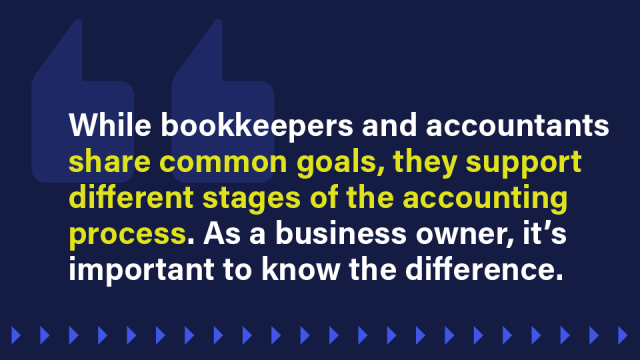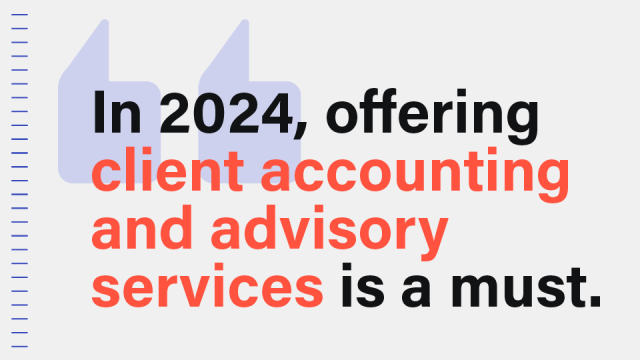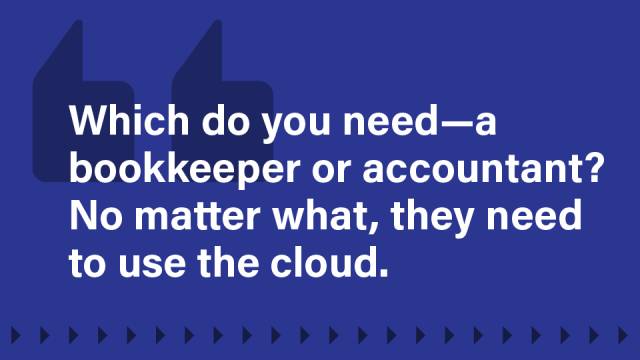Most people would be hard-pressed to describe the difference between an accountant and a bookkeeper.
While these financial roles share common goals, they support different stages of the accounting process. As a business owner, it’s important to know the difference.
In this post, we’ll review:
- Accounting and bookkeeping similarities and differences, and how to determine which to hire.
- When you should begin seeking financial support for your business.
- Why your accounting and bookkeeping team needs accounting cloud solutions and cloud bookkeeping.
Accounting and bookkeeping similarities and differences

Accounting is the process of keeping financials for a company by recording, summarizing, analyzing, advising and reporting. Certified Public Accountants (CPAs) usually perform accounting and assurance tasks.
Bookkeeping is the record-keeping part of the process in which all financial records of a business, including day-to-day transactions, are recorded and stored in a database. Bookkeepers don’t require a license but can choose to obtain a certification. The required certifications or licenses usually depend on where the individual, or the individual’s employer, is located.
Where bookkeeping ends, accounting begins
Bookkeepers’ and accountants’ work often overlap, as bookkeeping is a part of the accounting process.
A bookkeeper records and classifies a company’s daily financial transactions (e.g., sales, payroll, payment of bills). Their focus is on accurate record-keeping and summarizing data, and less focused on interpreting the data and analytics.
An accountant builds on the information provided to them by the bookkeeper. Typically, they’ll:
- Review financial statements prepared by a bookkeeper.
- Analyze, interpret or attest to this information.
- Turn the information (or records) into a report.
- Share advice and make recommendations based on what they’ve reported.
The records reported by the bookkeeper will determine the accountant’s advice to leadership and, ultimately, the health of the business overall. Each piece of the financial process is just as important as the next.
Bookkeeper or accountant: Which do you need?
It’s important to understand whether you need to hire a bookkeeper or an accountant. This choice primarily depends on the industry and the level of expertise required.
A bookkeeper is generally:
- Less expensive to employ.
- A great choice for handling daily transactions and repetitive processes.
However, if you need insight and advice on how to better operate your business at scale…you will need help from an accountant.
Here are some industry-related questions to consider when making your decision:
- What’s your knowledge of the accounting procedures and requirements for your industry?
- Do you have proper controls/understanding for paying invoices, monitoring inventory and receiving payments for your business?
- How many employees do you have and what are your payroll cycles?
- Are there industry-specific reporting requirements you must adhere to and are they currently being met?
Industries that work with complex financial systems and high-volume transactions require accountants (e.g., government agencies, colleges, hospitals).
A knowledgeable and skilled bookkeeper with years of experience and first-hand knowledge of accounting applications is—most likely—more qualified to run the books for your business than a recent accounting major graduate.
Keep this in mind when filtering applications; try not to judge applicants based on their education alone.
Consider these questions when reviewing a candidate:
- What is their level of expertise? Do they have certifications?
- Does this individual have experience in your industry?
- What services does the individual have experience offering?
In 2024, offering client accounting and advisory services is a must.

When should you seek financial support?
It’s never too early to engage an accounting professional. Business owners, who hire financial support in the early stages of their growth, rarely regret it…if ever!
An accounting professional can help you create a plan, ultimately saving you time and money in the future. And having the support of a bookkeeper will free up your time, allowing you to focus on what matters: Your business.
Choose what makes the most sense for your type of business. And simply pivot if—or when—you need to hire the other.
Accounting cloud solutions and cloud bookkeeping
Whatever position you choose—your accounting and bookkeeping team must work from the cloud. Why? The cloud’s security.
Here are three reasons why cloud bookkeeping and accounting are more secure than not working from a cloud environment:
- We can’t speak for all clouds, but our accounting cloud solutions contain the most advanced firewall protection, which blocks unauthorized users from accessing the servers where you and your clients’ data live. Additionally, data is encrypted at the highest levels so that even if a breach were to occur, your data and information stay unreadable.
- Certain cloud hosting providers (like Rightworks) incorporate built-in alerts into their products, in case unauthorized users attempt to gain access to a system. We also log all activities and events and notify our customers immediately when something doesn’t seem right.
- People make mistakes. Sometimes a malware-containing file is opened. Sometimes you accidentally delete the company file. So just in case of accidental loss or deletion, our accounting cloud solutions regularly back up everything housed in your cloud, nightly.
No matter who you choose—give them the cloud

Whether you choose a bookkeeper or accountant, give them the cloud.
Working in the cloud helps protect the most critical financial data your company holds, mitigates disastrous cybersecurity events and. ultimately, protects your business’s reputation.
For more information about the cloud’s built-in safeguards, read through some of our latest blog posts on the security of cloud hosting technology.


